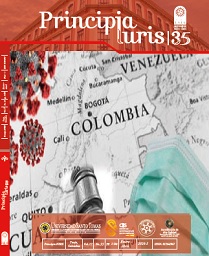The risk of horizontal property becomes a community of goods or a factual society
Main Article Content
Abstract
What generates among the co-owner’s responsibilities, no longer up to the amount of their contributions -including coefficients of co-ownership- but already in a solidary and unlimited manner. The research methodology used is the comparative documentary, taking as a macro conceptual framework the Colombian commercial code and Law 675 of 2001; The objective found was to demonstrate the risk and responsibility, which have the management councils of the P.h. and the legal representative or administrator, when by carelessness or negligence they do not comply with the annual obligations of registration and holding of assemblies.
Article Details
Por medio de esta comunicación certifico que el artículo que estoy presentando para posible publicación en la revista institucional impulsada de la Facultad de Derecho de la Universidad Santo Tomás seccional Tunja, Principia Iuris, es de mi entera autoría, siendo sus contenidos producto de mi directa contribución intelectual.
Todos los datos y referencias a publicaciones hechas están debidamente identificados con su respectiva nota bibliográfica y en las citas que se destacan como tal.
Por todo lo anterior, declaro que el material presentado se encuentra conforme a la legislación aplicable en materia de propiedad intelectual, y por lo tanto, me hago responsable de cualquier reclamación relacionada a esta.
En caso de que el artículo presentado sea publicado, manifiesto que cedo plenamente a la Universidad Santo Tomás seccional Tunja los derechos de reproducción del mismo y accedo a las modificaciones que de forma se requieran para adaptarse a la estética de la revista. Como contraprestación de la presente cesión, declaro mi conformidad de recibir (2) ejemplares del número de la revista en que aparezca mi artículo.
References
Ospina, D. Felipe. “Análisis a la aplicación de la solución dada por el régimen de la propiedad horizontal al conflicto de agencia entre accionistas mayoritarios y accionistas minoritarios en la sociedad anónima”. Tesis de Maestría en derecho privado USTA – Tunja. 2018.
González Benjumea, Óscar H. El administrador de hecho en el derecho societario colombiano. Ed. U. Autónoma Latinoamericana – UNAULA, 2018.
Superintendencia de sociedades. Concepto 12306/98, mar. 25
Artículo 86 de la ley 675 de 2.001. RÉGIMEN DE TRANSICIÓN. Leyes 182 de 1948, 16 de 1985 y 428 de 1998
Sentencia C-488-02 de 26 de junio de 2002, Magistrado Ponente Dr. Álvaro Tafur Galvis
Art. 1568, inc. 2º Código Civil colombiano
Art.50, ley 672 de 2.001
Superintendencia de sociedades. Concepto 220-114168. Asunto: Responsabilidad solidaria de los socios en una sociedad de hecho.
Art. 501 C. de Co. y 1573 del C.C

